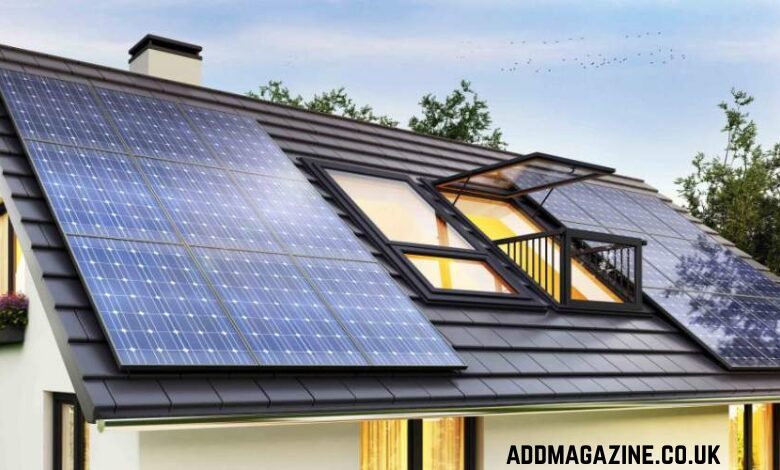As energy costs continue to rise and climate challenges intensify, UK homeowners are increasingly seeking ways to save money while living more sustainably. Solar technology has emerged as one of the most effective and accessible solutions. Today, home solar panels are no longer a futuristic idea but a practical, everyday upgrade that can transform how we power our homes.
Why Home Solar Panels Are in High Demand
The UK’s net-zero commitment has driven a surge in renewable energy adoption, and solar panels sit at the heart of that transition. Over the past decade, solar technology has become dramatically more affordable and efficient.
Government schemes like the Smart Export Guarantee (SEG) enable homeowners to sell unused electricity back to the grid, turning rooftops into income-generating assets. With installation costs falling and output increasing, investing in solar is now both financially and environmentally strategic.
How Home Solar Panels Work
Home solar systems use photovoltaic (PV) cells to capture sunlight and convert it into usable electricity. Here’s the process in brief:
- Panels absorb sunlight, producing direct current (DC).
- An inverter converts DC into alternating current (AC) — the type your home uses.
- The AC power runs household appliances, lighting, and systems.
- Any surplus energy is either stored in a battery or exported to the grid for credit.
This self-sufficient cycle reduces dependency on external suppliers and ensures stable energy production even as utility rates fluctuate.
The Real Cost of Going Solar in 2025
In 2025, the average installation cost for Home Solar Panels in the UK ranges from:
- £4,000–£5,000 for a 3kW system (suitable for small homes)
- £6,000–£8,000 for a 5kW system (average household)
- £10,000–£12,000 for larger properties or systems with battery storage
These costs vary based on location, roof size, and energy needs. Despite the initial investment, most homeowners recoup the cost within five to seven years through savings and SEG payments.
To see how pricing, performance, and incentives compare across the UK, this detailed industry overview on residential solar panel costs in the UK 2025 breaks down system sizes, return on investment, and key trends for homeowners considering solar adoption.
Financial and Environmental Benefits
1. Lower Electricity Bills
Solar panels can reduce electricity bills by up to 80%, especially when paired with energy storage. Many households are now producing enough energy to offset nearly all grid use.
2. Reliable Long-Term Savings
Panels typically last 25–30 years with minimal maintenance. After the initial payback period, homeowners enjoy decades of free power.
3. Increased Property Value
Solar-equipped homes often sell for more, as buyers value lower running costs and sustainability features.
4. Reduced Carbon Emissions
Each home solar system can prevent over one tonne of CO₂ emissions annually, directly supporting the UK’s green energy transition.
Maintenance and Longevity
Modern solar panels are built for durability and require very little upkeep. A quick rinse with water every few months removes dirt and dust. Most systems also include real-time monitoring, helping you track performance and detect any drop in efficiency instantly.
Manufacturers now offer 25-year warranties covering both product quality and power output, ensuring that your investment remains secure for decades.
Factors to Consider Before Installation
Before investing in home solar panels, it’s important to review:
- Roof orientation and shading: South-facing roofs get maximum exposure.
- Roof condition: Ensure structural soundness before installation.
- Energy consumption: Analyse your annual usage to size your system correctly.
- Battery storage: Adds resilience but increases upfront cost.
- Installer credentials: Always hire MCS-certified professionals for guaranteed quality and compliance.
A good installer will provide a detailed energy audit, financial projection, and system design customised to your home.
The Future of Home Energy
The evolution of home solar energy is moving toward complete energy autonomy. Integration with EV charging, smart batteries, and AI-based energy management is turning ordinary homes into micro power stations. In the near future, connected neighbourhoods may share excess energy locally, reducing strain on the grid and improving community sustainability.
Final Thoughts
Installing home solar panels is no longer just an eco-friendly choice — it’s an intelligent financial move. As installation costs drop and government support strengthens, the benefits continue to grow.
Homeowners who invest now stand to enjoy lower bills, higher property values, and a lasting contribution to a greener planet.
For those exploring installation costs, incentives, and return on investment, Solar4Good’s expert analysis on residential solar panel costs in the UK 2025 provides a valuable guide to help you make an informed decision.




